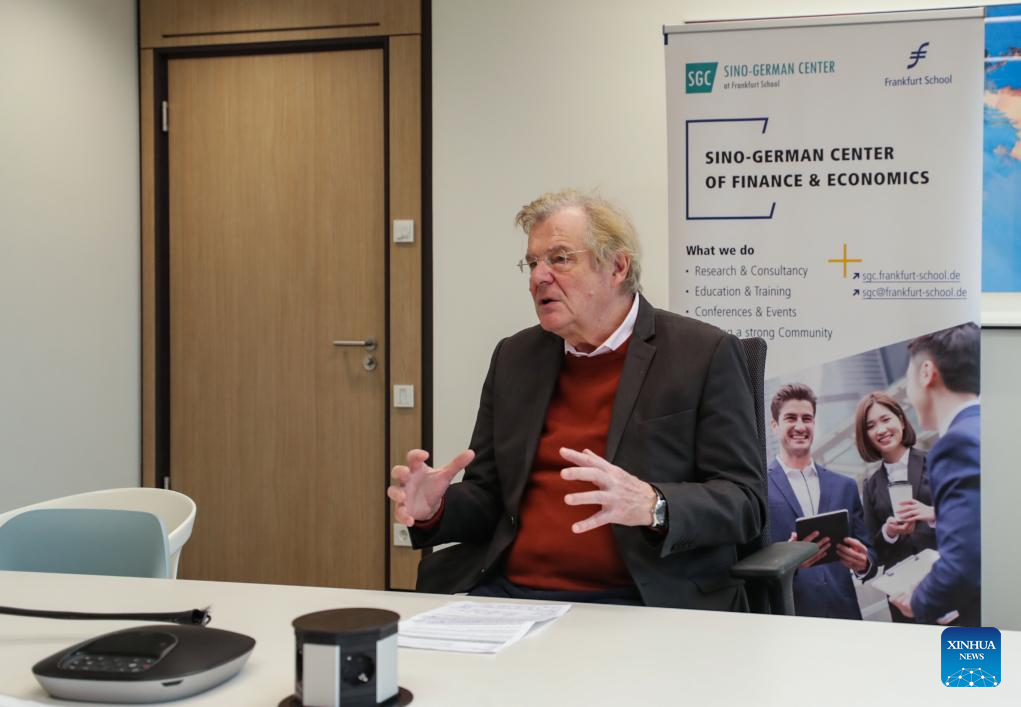Interview: China's stimulus measures timely to boost confidence, says German economist

Horst Loechel, professor of economics and co-chairman of the Sino-German Center at the Frankfurt School of Finance and Management, speaks during an interview with Xinhua News Agency in Frankfurt, Germany, Dec. 16, 2024. China's recent stimulus measures came at the right time to boost investor confidence worldwide, the leading German economist said. As two large exporters, both Germany and China have benefited from economic globalization and trade liberalization, and made due contributions, he noted, stressing that joint efforts are still needed to "promote free, open trade and work against protectionism."(Xinhua/Zhang Fan)
FRANKFURT, Dec. 21 (Xinhua) -- China's recent stimulus measures came at the right time to boost investor confidence worldwide, a leading German economist has said.
The stimulus package represents the right policy of the Chinese government to stabilize the overall situation, said Horst Loechel, professor of economics and co-chairman of the Sino-German Center at the Frankfurt School of Finance and Management.
The Chinese economy fared well this year, with a growth rate close to 5 percent in line with Beijing's projection, the expert told Xinhua in a recent interview, calling this "a success."
He said he believes the country's private consumption and government investment are likely to rebound, and if that happens, China's growth will register over 5 percent in 2025.
China continues to be a preferential investment destination for German companies, as shown by a business confidence survey published by the German Chamber of Commerce in China earlier this month.
Up to 92 percent of the survey's respondents confirmed that they would continue to operate in China despite challenges. "The reason is totally clear," Loechel said.
China is a predominantly huge market with a growing middle-income class and has become a leading innovator, especially in the electric vehicle (EV) industry, he added.
As two large exporters, both Germany and China have benefited from economic globalization and trade liberalization, and made due contributions, he noted, stressing that joint efforts are still needed to "promote free, open trade and work against protectionism."
Furthermore, he said bilateral cooperation across the board would bring the two countries closer. "We will see more joint ventures, more cooperation between Germany and China, which we already have in the automotive industry," he said.
Chinese companies and their innovations can effectively inspire the German automotive industry, he said, emphasizing that European Union (EU) tariffs on Chinese EVs will impede Europe's green revolution.
The overwhelming majority of the European automotive sector strongly opposes such protectionist measures, said the expert, adding that it reflects more of an internal political power struggle within the EU, rather than a rational business decision.
"We want to resolve this issue. We are not interested in worsening the business and political relationship with China," he added.
Photos
Related Stories
- Interview: Germany-China economic ties a stabilizing force for Europe, says ex-Bundestag VP
- Senior CPC official meets German FM
- China, Germany hold strategic dialogue on diplomacy and security
- Financial experts call for China-Germany cooperation, warn against protectionism
- German firms urge green cooperation, oppose EV tariffs
Copyright © 2024 People's Daily Online. All Rights Reserved.









